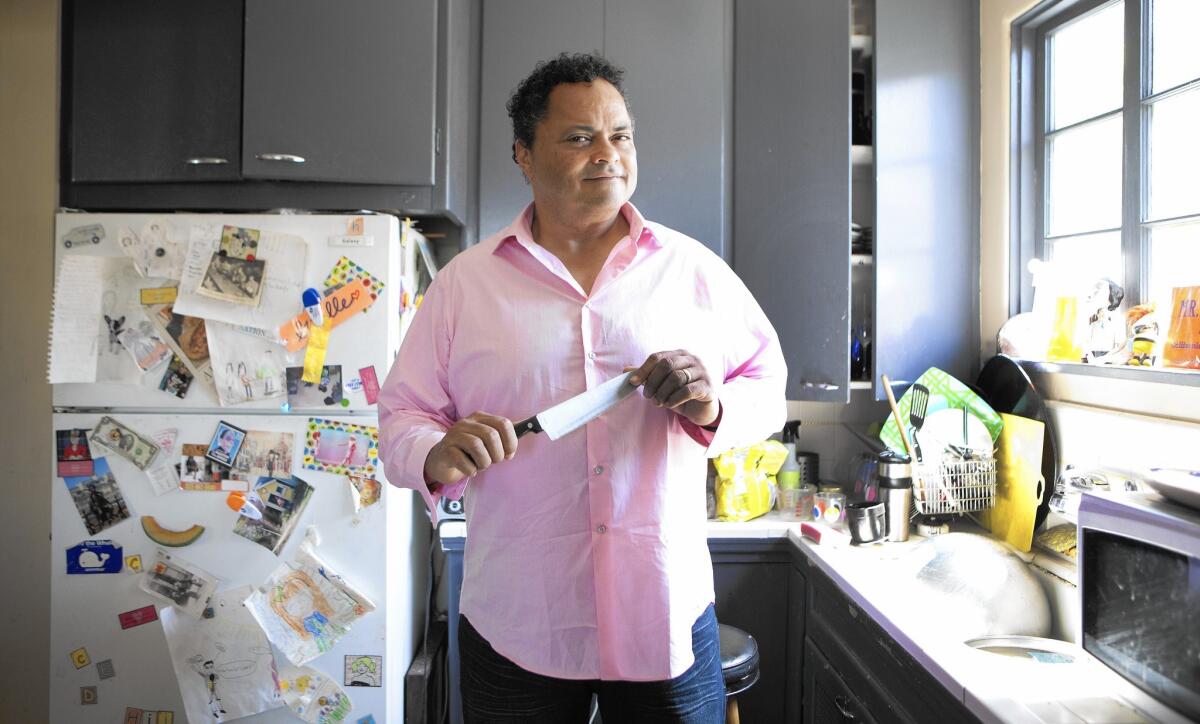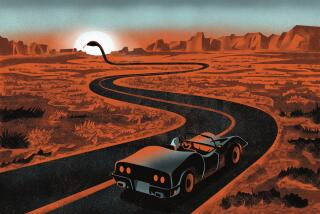Black nerd culture has its day in ‘Dope’

Author Jervey Tervalon says the new film “Dope” captures black nerd culture in a way that reminds him of his youth in Los Angeles
The world of the black nerd in contemporary Inglewood, as depicted by screenwriter and director Rick Famuyiwa in his new film “Dope,” is one I instantly recognize.
Years ago, I was raised in a Harlem Crip neighborhood in Los Angeles’ Jefferson Park. My pootbutt friends and I played chess, flew model rockets in science fairs, studied martial arts, read science fiction and serious literature by writers of various colors. We were straight and gay, we were virgins and we listened to “white music,” as well as black.
Famuyiwa’s “Dope” is pretty much how it was back in the day for me. The film even evokes memories of the Fellas, my brothers’ smoking and drinking buddies, who were arrested regularly at gun point by the LAPD, but broke the thug stereotype with complex conversations about racism in H.P. Lovecraft, debates over the Vietnam war and the space race as they smoked high-grade weed.
Me, it was more the Crips that I worried about than the police. I didn’t want to get stomped to death at a party like some unlucky busters I knew. I was a kid who wanted to be left alone to read because I knew the score — if I decided to chase girls I might get myself killed. Lucky for me I avoided the bullet the time I tried, but did get the beat-down — nothing horrible, just a mild concussion. I never got the girl; instead, I got the desire to write about what mattered to me, what I saw.
Life was complicated and narratively interesting in my neighborhood, with homemade peach brandy-soaked barbecue and good friends who would never make it out of the hood.
When I got to college, I found the best representation of nerd culture of color in “Love and Rockets,” that groundbreaking comic book from the Hernandez Brothers. Though centered on Mexican American characters in Oxnard and Ventura, it was and still is inclusive — cut from the same cloth as the black pootbutt experience. Junot Diaz emerged to carry the literary flag for ascendant nerdness of color, but in my view, Famuyiwa now owns it in Hollywood.
A film school grad from USC, Famuyiwa mentions the influences of “The Breakfast Club” and “Ferris Bueller’s Day Off,” and how he could vest in those experiences of white suburbia. With “Dope,” he’s said he hopes white film executives will discard comfortable categorizations and accept the possibility that the film could find a broad audience, not just a black one. It’s ridiculous that he would even have to argue that point — and that to get the film made it took producers largely of color, including Forest Whitaker, who also produced Frutivale Station, Nina Yang Bongiovi, Pharrell Williams, Michael Y. Chow and Sean Combs.
On the other hand, it’s a good sign that there are enough black powerbrokers to make this coming-of-age story of a different shade.
Still, why is it that Hollywood’s movie executives seem to be missing the changing demographics of the United States, while television and cable are making buckets of money embracing diversity? The country is browning and all our stories need to be seen.
Maybe this is why I see “Dope” as an instant classic that’s more a comic homage to “Pulp Fiction” with hints of “The Matrix” than to “Boyz in the Hood” or “Menace II Society,” as much as I’m a fan of those movies.
What I most appreciate about “Dope,” is how Famuyiwa presents and values black intelligence. The focus is on Malcolm (Shameik Moore), a brilliant senior in high school who is not jaundiced or cynical. He’s just world weary from the existential concerns of not dying in some ridiculous fashion — like his friend killed in the middle of playing a video game while standing in line to order a burger.
Malcolm’s aspiration to attend Harvard is laughed at by those who could and should help him. Even the gangsters in “Dope” aren’t idiots, and appreciate learning for learning’s sake while brutally implementing concepts such as the “slippery slope,” as the rational for beating down those who aren’t totally compliant in their obedience.
When Malcolm’s love interest Nakia (Zoe Kravitz) studies for the GED exam, he encourages her to aim higher than community or state college. Harvard is worth more than crazy money, or even his life as he triumphs over Bloods who normally kick his ass, or discovering that the black man who can open the door to Harvard admittance is as corrupt, crazy and dangerous as any street gangster.
Education is the one thing they can’t take from you even if they won’t produce your movie.
Tervalon is author of “Understand This” and “Monster’s Chef.”
More to Read
Only good movies
Get the Indie Focus newsletter, Mark Olsen's weekly guide to the world of cinema.
You may occasionally receive promotional content from the Los Angeles Times.






